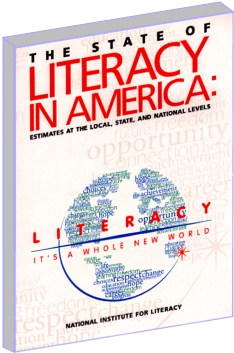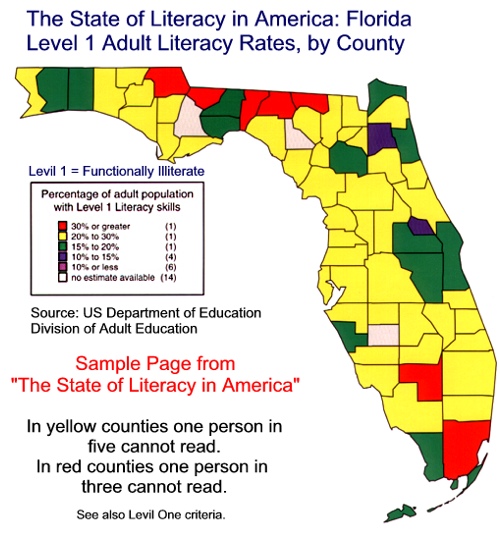
Next Page: History of Literacy Initiatives in the U.S.
Mission Statement - American Literacy Council Close This Window
Brief History of the American Literacy Council:
The American Literacy Council is the name of the non-profit organization organized by scholars in 1876 to provide rural educators with literacy tools and methods appropriate for schools at that time. Their focus included considerable linguistic research related to the study of illogical spelling standards that underlie standard English spelling. Major names and organizations supported their efforts including Andrew Carnegie, Melvin Dewey, many book authors, and newspaper editors of that time period. The organization continued, evolving to be renamed "The American Literacy Council."
|
Department of Education statistics indicate that, in the United States, approximately one person in five cannot read English adequately,
measured by national surveys at the county level, counting people with an inability to read want ads, fill out job application forms, read maps, or read story books to children. One source for the statistic that "One In Five Can't Read," is in the 1998 survey publication by the National Institute for Literacy titled "The State of Literacy in America" available from their hotline at (800) 228-8813 See also their web site with comparative data from 2003 surveys by clicking here [http://nifl.gov] . This page will still be visible when you return. |
 |
Today several activities dominate the American Literacy Council. The Council maintains this web portal that offers literacy resources and software. We provide materials and aids that can be used in homes, libraries, literacy centers, and schools for people of all ages that have difficulty learning the English written language. We are governed by a board of scholars and hands-on literacy experts who meet annually to review our contributions, grants, contributors, and out-sourced projects.
Primarily the American Literacy Council (ALC) supports and maintains this literacy "portal" as a doorway looking out onto a vast universe of resources such as literacy agencies, state and federal literacy programs, government grants, and tools that assist foreign-born people who are learning English. More than 20 million writings, films, books, literacy tools and internet archives related to literacy are regularly searched, summarized, and evaluated as to content and value. As new ideas, writings, methods, or materials emerge they will usually become visible here in service to the support of English literacy.

Since written English does not make consistent use of the simple phonetic assumptions that other European languages generally use, software has been developed that enables non-readers to begin writing phonetically by using letters as they experimentally think they might be used. As with all uses of the phonics method, phonics is a temporary bridge to normal English reading and writing. However, the computer can almost instantly correct mistaken invented spellings and phonic-like spellings - correcting them instantly. As a bonus it can audibly speak each corrected word clearly through the sound system that is typically found in desktop and laptop PCs. This Sound-Write software operates similar to a word processor for people just beginning to read or write.[Click to go to the Software Section]
Similarly the ALC software called "DoubleLine" assists new-comers to English orthography by providing an add-on to Microsoft(tm) Word.[Click to go to the Software Section]
Meanwhile, spelling is not a school subject in Spain, Italy, Germany, Russia, and other countries where letters are used with much greater consistency to represent spoken sounds. This fundamental fact makes the teaching of reading to foreign-born people and to adults - a very difficult experience, unlike the simple orthography in other European and western language groups.
To the extent that teachers and literacy center workers find success in using phonics materials as a first step in teaching English as a second language, they may also be interested in the list of 7000 English words that are spelled phonically (consistent use of letters) here: -
"American Spelling." Whereas phonics materials normally provide a small vocabulary of 300 words that are simplified to a consistent spelling standard, the "American Spelling" book expands that phonics consistency to 44,000 words, suitable for adult learners. Phonics methods are commonly used as a temporary bridge that introduces non-readers to the concept of reading - looking at written syllables associating sounds with them, then imagining that they are speaking them.
A variety of scholars and concerned people continue to contribute to the American Literacy Council. See Board Members and Associates where current management and recent contributors are described. Additionally several corporate contributors continue to vigorously support the battle for literacy including IBM Corp. who donates regularly to this organization.
See also the longer history of literacy in America and historic activities of the ALC that includes dates and people who published works related to literacy or organized literacy groups and resources across the past 100 years in the battle for English literacy.
Next Page: History of Literacy Initiatives in the U.S.
Mission Statement - American Literacy Council Close This Window